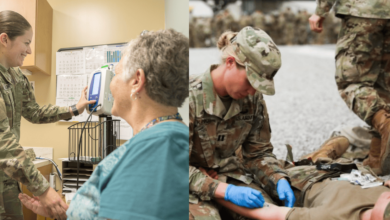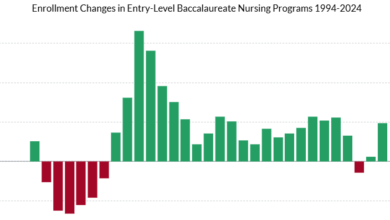Regulation of advanced practice nurses to go ahead

The Nursing and Midwifery Council (NMC) will move to regulate advanced practice nursing across the UK, in what has been described as a “defining moment” for the profession.
The regulator has been undertaking a review of advanced practice since 2022 and it has found huge variation in how professionals enter and undertake advanced practice roles.
“The work has taken place at a time when the NMC’s role in the public protection and patient safety has never been more important”
Kay Fawcett
There is currently no single definition of what an advanced practice nurse is, what education they should have and what skills they need.
This variation could risk public perception of advanced practitioners, and therefore confidence and trust for those working in those roles, the review warned.
As such, the NMC has concluded that additional regulation of advanced practice is needed for both nursing and midwifery professionals.
At a meeting today, the NMC governing council gave the move the green light.
Kay Fawcett, chair of the NMC’s advance practice steering group, told the NMC council today that this was a “defining moment for nursing and midwifery”.
She said: “The work has taken place at a time when the NMC’s role in the public protection and patient safety has never been more important.
“The consistency essential for safe practice by nurses and midwives applies in advanced practice just the same way as it applies in any other area of our work.”
The NMC has now set out three steps that it will take to push this work forward:
- Develop standards of proficiency for advanced level practice and associated programme standards;
- Adopt a collaborative approach to develop a UK wide advanced practice principles framework incorporating a shared position or definition of advanced level practice;
- Ensure that advanced level practice requirements are included in the wider review of revalidation and the NMC code scheduled for 2025-26.
These approaches can either be developed at the same time, or in a phased way, the NMC has said.
In its most recent council papers, the NMC argued that implementing these changes would ensure that the risks identified in phase one of the advanced practice review would be mitigated.
It added that this type of regulation would ensure that advanced practice nurses were educated to approved standards, able to deliver high level and quality care and can maintain their knowledge and skills through professional development.
“It’s very difficult to actually nail down how many advanced practitioners there are in the country”
Sam Foster
Meanwhile, NMC registrant member, Claire Johnston, said the decision today would have “a profound and far reaching effect”.
She said: “The variation issue is very confusing for the public, so seizing the moment does truly matter.
“We will, as a regulator, be playing a critical part in helping the four countries achieve the goals in the four workforce plans.”
Following the decision today, the NMC will look to move into the next phase of its advanced practice review.
This phase will involve coming up with further details on timelines and milestones for regulation, which the NMC will provide an update on at its next council meeting in May 2024.
The NMC’s executive nurse director of professional practice, Sam Foster, told the council that phase two would be “complex”.
“It’s very difficult to actually nail down how many advanced practitioners there are in the country, but there are several thousand people practising as advanced practitioners,” she said.
Ms Foster noted that the NMC would now need to consider how further regulation would impact those already working at advanced practice level, those who are currently completing qualifications in advanced practice and those who would be pursuing advanced practice in the future.
She added that the NMC had been working closing with other healthcare regulators, as well as the Council of Deans of Health, and would continue doing so in the second phase of the review.






